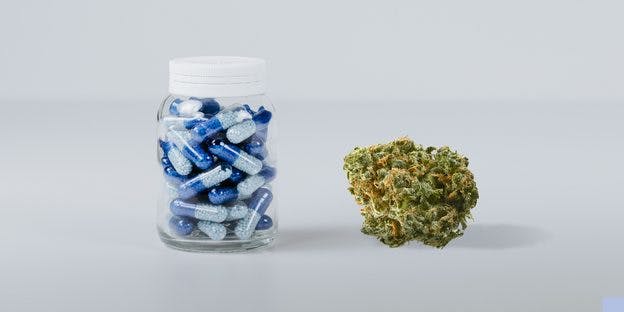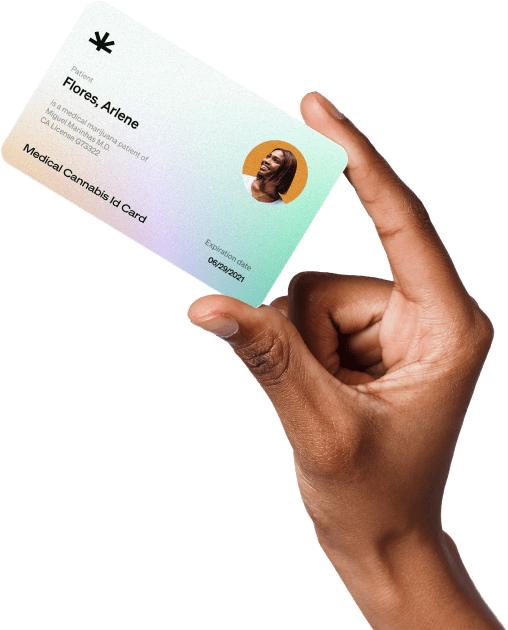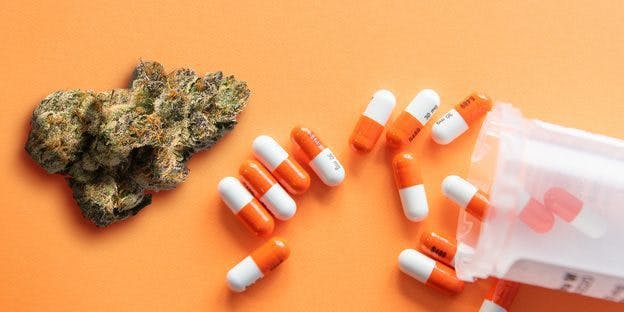Can You Use Marijuana If You Take Adderall?

Article written by

Dipak HemrajHead of Research and Education
Content reviewed by

Dr. Lewis JasseyMedical Director - Pediatric Medicine
While there are some benefits to using cannabis to manage attention deficit hyperactivity disorder (ADHD), there are also some potential dangers when mixed with prescription drugs used to treat symptoms, like Adderall.
Many people with ADHD use prescription stimulant medications like Adderall (Mydayis) to increase focus and decrease impulsivity. Unfortunately, mixed amphetamine salts like Adderall have several negative side effects, including insomnia, weight loss, and addiction. Many ADHD patients utilize cannabis to reduce or replace prescription amphetamines and manage their side effects.
Get your medical marijuana card
Connect with a licensed physician online in minutes.
What Is Adderall?
Adderall is the trade name for mixed amphetamine salts.
Adderall contains four salts of amphetamine: equal parts dextroamphetamine and racemic amphetamine, which produces a (3:1) ratio between dextroamphetamine and levoamphetamine. Mydayis is another trade name for mixed amphetamine salts.
Uses and How It Works
Adderall is usually prescribed for ADHD or narcolepsy, where they have been proven to be quite effective in managing symptoms. Adderall and other stimulants (e.g., methylphenidate/Ritalin) are often prescribed to help increase focus and reduce impulsivity. Adderall is usually prescribed in low doses to prevent addiction, but even therapeutic doses can induce euphoria, increase wakefulness, reduce sex drive, and have a high potential for dependence. In non-prescription scenarios, Adderall may be used as an athletic performance enhancer, a study drug, and an appetite suppressant. Like other stimulants, Adderall can be misused in a nonmedical setting.
Adderall is a central nervous system (CNS) stimulant of the phenethylamine class. Amphetamine, the primary active ingredient in Adderall, works by increasing the activity of dopamine and norepinephrine neurotransmitters. Adderall also triggers the release of other hormones and neurotransmitters, like epinephrine and serotonin. Adderall also synthesizes neuropeptides like cocaine and amphetamine-regulated transcript (CART) peptides.
People with ADHD have a higher concentration of dopamine receptors in their brains, which removes dopamine too quickly to have any effect. Those with ADHD may seek stimulation to boost dopamine production. Unfortunately, this can include addictive behaviors such as gambling and substance abuse. Increasing dopamine production can help reduce this need for constant stimulation.
Adderall is often prescribed in immediate and/or extended-release forms. The immediate-release version has an onset time of 30 minutes to one hour and lasts four to six hours; the extended-release version has a similar onset time and lasts up to 12 hours.
Potential Benefits and Risks of Mixing Cannabis and Adderall
Mixing any medication usually has several side effects to consider. Unfortunately, due partly to cannabis’ legal status, we know little about how cannabis interacts with different drugs. Moreover, cannabis is a botanical containing hundreds of active cannabinoids and terpenes in various ratios. This means that one type of cannabis may interact differently with a drug than another type of cannabis.
However, we know some things about cannabis and how it might interact with stimulant-based medications.
Potential Benefits
One of the most common reasons people turn to medical cannabis is that it has fewer side effects than amphetamines. Patients commonly report the following symptoms while using Adderall:
- Loss of appetite
- Weight loss
- Dry mouth
- Stomach upset/pain
- Nausea/vomiting
- Dizziness
- Headache
- Diarrhea
- Fever
- Nervousness
- Trouble sleeping
Medical cannabis also has anti-emetic (anti-nausea and anti-vomiting), appetite-stimulating, and anxiolytic (anti-anxiety) effects that can help manage these side effects.
A study of 59 adults with ADHD found that taking a high dose of cannabis reduced dependency on ADHD drugs while also improving ADHD symptoms. Cannabinoids and terpenes like tetrahydrocannabinol (THC), cannabidiol (CBD), cannabinol (CBN), pinene, limonene, and beta-caryophyllene may all help manage ADHD symptoms. Limonene, in particular, may inhibit methamphetamine-induced locomotor activity, suggesting that it can help reduce drug-seeking behavior.
Download Free Guide to CBD
Potential Risks
Just as there are many potential benefits in using medical cannabis to manage ADHD, there are some potential risks.
Medscape suggests that using cannabis with amphetamine/dextroamphetamine may increase the level or effect of dextroamphetamine by affecting hepatic enzyme cytochrome P2D6 (CYP2D6) metabolism. Another issue is that the sedative effects of cannabis may clash with the stimulating effects of Adderall, which can cause heart and blood pressure concerns. Other potential risks include:
- An increased risk of dry or cottonmouth, which are side effects of both cannabis and amphetamines. This can increase the likelihood of dental problems.
- Those with ADHD are at greater risk of substance use disorders, meaning cannabis use disorder (CUD) is possible.
- Endocannabinoids can be crucial in regulating the HPA axis and stress responses. Some people with ADHD/ADD may be sensitive to THC due to a compromised hypothalamic-pituitary-adrenal axis (HPA axis), which controls reactions to stress. Too much THC may cause anxiety and further compromise the HPA axis.
- Medical cannabis is better suited for adults with ADHD than children with ADHD.
Download Free Guide to THC
What to Do If You Need to Use Both Adderall and Marijuana
To reduce the likelihood of suffering from adverse effects, it is best to tell your physician that you plan on utilizing medical cannabis to manage your ADHD symptoms and commit to a plan to reduce or even replace Adderall.
Why Mixing Cannabis with Adderall Can Help You Feel Better
Although it is essential to be careful when mixing cannabis and Adderall, the two may have synergistic effects when used together in an appropriate dose, further increasing dopamine production. Medical cannabis can also help overcome appetite loss, headaches, and insomnia associated with Adderall use.
Download Free Guide to Marijuana and Insomnia
The Bottom Line
It is certainly possible to use Adderall in combination with cannabis, which comes with potential benefits and drawbacks. Still, those intending to reduce or replace their ADHD medications may find medical cannabis more tolerable than the regular use of prescription amphetamines.
Please note: The information in this article does not constitute medical advice.
Get Your Medical Card
Connect with a licensed physician online in minutes.



